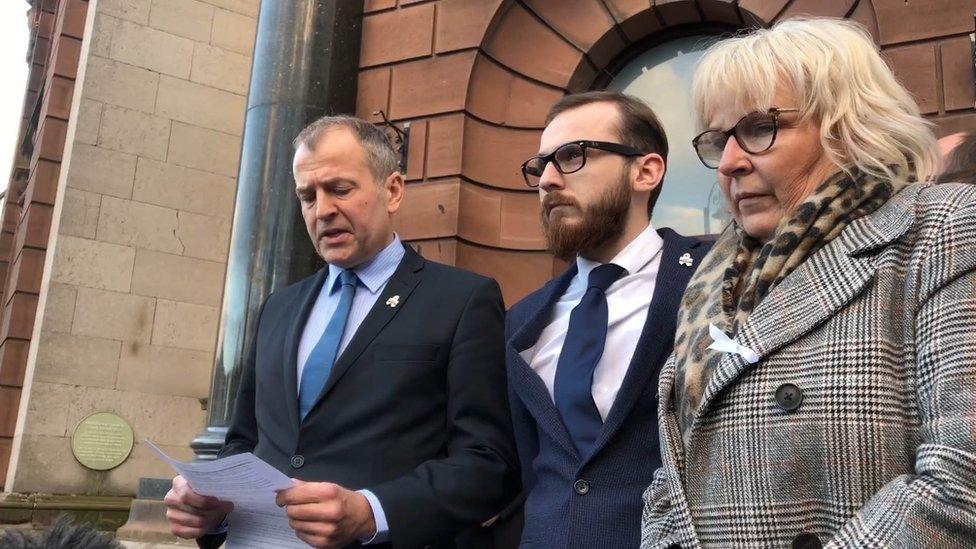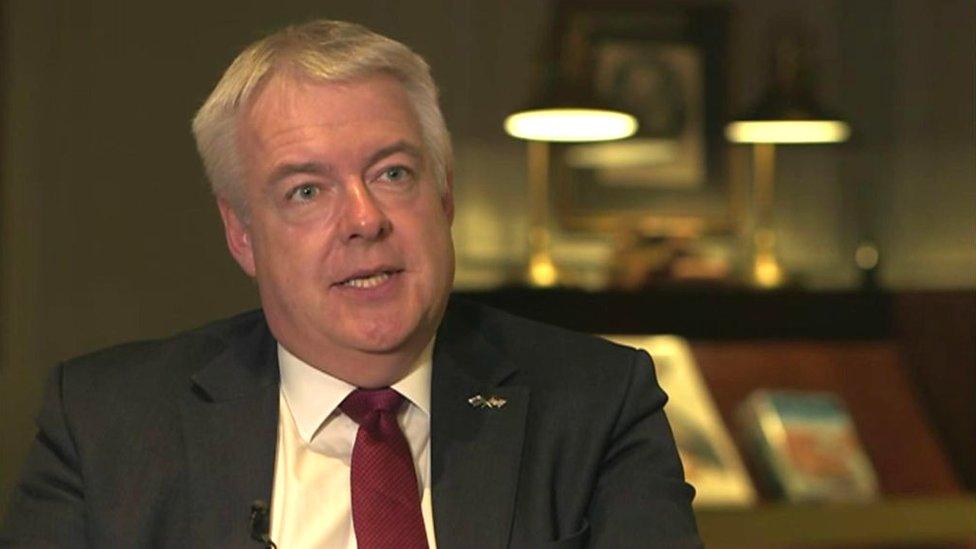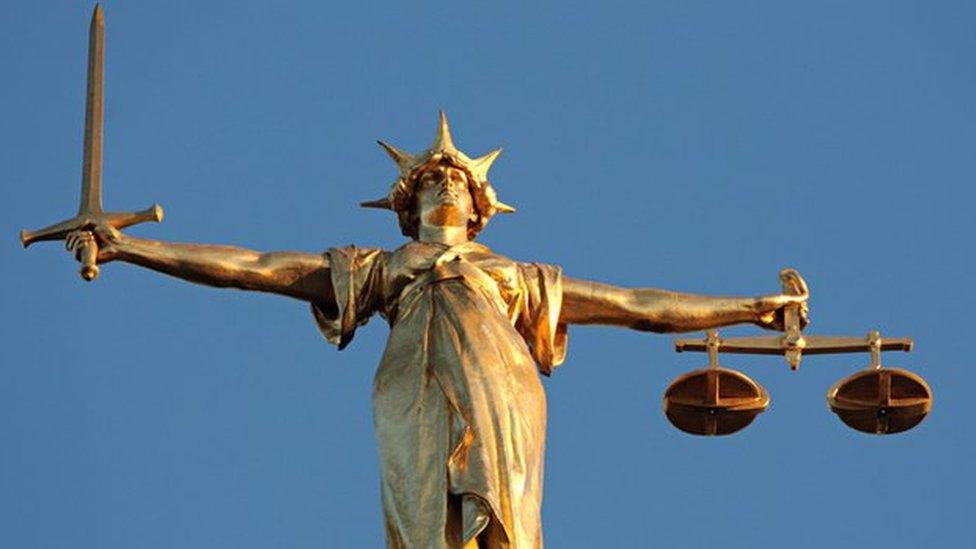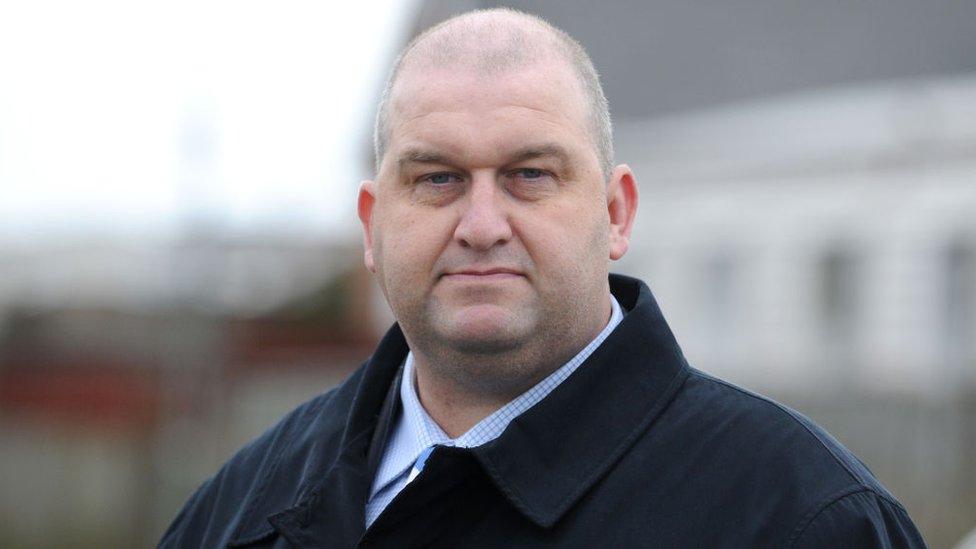Carl Sargeant: Carwyn Jones 'own judge' in sacking probe
- Published

Carl Sargeant died in November 2017
Ex-first minister Carwyn Jones was like a "judge in his own court" setting rules for a probe into his handling of the sacking of Carl Sargeant, lawyers for the late AM's family have said.
A judicial review heard the QC due to lead the investigation had expressed concerns about Mr Jones's involvement.
The AM for Alyn and Deeside was found dead in November 2017, days after Mr Jones sacked his communities secretary.
Mr Jones's lawyer said only the first minister could give such instructions.
An inquest has given a provisional cause of death as hanging.
After Mr Sargeant's death, following pressure from the late AM's family and Labour politicians, Mr Jones called an investigation to examine his handling of the sacking.
Mr Sargeant had been dismissed over allegations of inappropriate behaviour towards women.
QC Paul Bowen was appointed to lead the independent inquiry in agreement with the family, but the family's decision to use a judicial review to question the format of the investigation has meant its work has not begun.
On Thursday lawyers for Mr Sargeant's widow, Bernie Sargeant, told a High Court hearing new evidence came to light while preparing for the judicial review which contradicted Mr Jones's statements that the investigation would be "independent" of him.
Lesley Thomas QC referred to a letter sent by the independent investigator, Paul Bowen QC, on the 20 April 2018, in which Mr Bowen raised concerns about the involvement of Mr Jones as a possible "conflict of interest".

Solicitor Neil Hudgell (left) stood with Carl Sargeant's son Jack and his widow Bernie outside the inquest
One of the decisions taken by Mr Jones, according to Mr Thomas, was that they would not be allowed to cross-examine him.
"He is controlling the process in which he will give evidence," Mr Thomas told the two judges, Lord Justice Haddon-Cave and Mr Justice Swift.
"We say, where there is an investigation, the person being investigated cannot set the terms of reference."
Mr Thomas argued that Mr Jones should have delegated the powers over the investigation to a civil servant or another minister in his government.
He said the "operational protocol" setting out how the investigation takes place should be quashed.
The family's QC said: "This is the fundamental flaw, unlawfulness and unfairness of the process. It's entirely misleading."
He added that the process amounted to a "breach of natural justice" because Mrs Sargeant was not aware of the involvement of the former first minister in the terms of reference.
"The subject of the investigation should not be determining the ambit of the investigation into himself," he said.

Carwyn Jones announced he was standing down five months after Carl Sargeant died
But Catherine McGahey QC, the lawyer for Mr Jones, told the Cardiff hearing the former first minister had no choice but to outline the parameters of the investigation because the law said only he could give such instructions.
"The powers and the responsibilities are his...the remit could not have been left completely open," said Ms McGahey.
Mr Jones had delegated the powers to detail the scope of the investigation to the Welsh Government's most senior civil servant, Permanent Secretary Dame Shan Morgan.
Ms McGahey said Dame Shan needed to have an idea, "reasonable direction", of what was expected of her.
'Difficult'
She also told the court Mr Jones had promised three women who made complaints against Mr Sargeant that he would not pass on their details to anyone else.
That, according to Ms McGahey, was why Mr Jones had insisted on certain provisions.
"He had an obligation of confidence to them," she said.
Another element highlighted by Ms McGahey was that Mr Jones had only had further involvement after the family of Mr Sargeant and the investigator Paul Bowen QC had asked for changes to protocols which went beyond the powers which had been delegated to the permanent secretary.
"Every decision taken was more advantageous to the family or the investigator," she said.
The judges will now consider their decision on what they called an "interesting but difficult case".

What is a judicial review?

A judicial review is a type of court proceeding in which a judge reviews the lawfulness of a decision or action made by a public body.
It is not really concerned with the conclusions of that process and whether those were "right", as long as the right procedures have been followed. The court will not substitute what it thinks is the 'correct' decision.
This may mean that the public body will be able to make the same decision again, so long as it does so in a lawful way.
- Published13 November 2018

- Published8 October 2018

- Published30 November 2018
